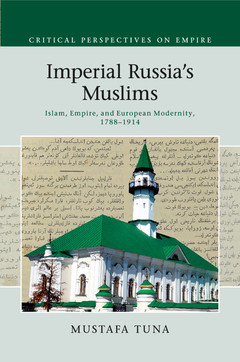Imperial Russia's Muslims Islam, Empire and European Modernity, 1788–1914 Critical Perspectives on Empire Series
Langue : Anglais
Auteur : Tuna Mustafa

This book investigates the entangled transformations of Russia's Muslim communities from the late eighteenth century through to the First World War.
Imperial Russia's Muslims offers an exploration of social and cultural change among the Muslim communities of Central Eurasia from the late eighteenth century through to the outbreak of the First World War. Drawing from a wealth of Russian and Turkic sources, Mustafa Tuna surveys the roles of Islam, social networks, state interventions, infrastructural changes and the globalization of European modernity in transforming imperial Russia's oldest Muslim community: the Volga-Ural Muslims. Shifting between local, imperial and transregional frameworks, Tuna reveals how the Russian state sought to manage Muslim communities, the ways in which both the state and Muslim society were transformed by European modernity, and the extent to which the long nineteenth century either fused Russia's Muslims and the tsarist state or drew them apart. The book raises questions about imperial governance, diversity, minorities, and Islamic reform, and in doing so proposes a new theoretical model for the study of imperial situations.
Acknowledgements; Notes on transliteration and dates; Introduction; 1. A world of Muslims; 2. Connecting Volga-Ural muslims to the Russian State; 3. Russification: unmediated governance and the Empire's quest for ideal subjects; 4. Peasant responses: protecting the inviolability of the Muslim domain; 5. Russia's great transformation in the second half of the long nineteenth century (1860–1914); 6. The wealthy: prospering with the sea-change and giving back; 7. The cult of progress; 8. Alienation of the Muslim intelligentsia; 9. Imperial paranoia; 10. Flexibility of the Imperial domain and the limits of integration; Conclusion; Bibliography.
Mustafa Tuna received his Ph.D. from the History Department of Princeton University, New Jersey in 2009 and is currently the Andrew W. Mellon Assistant Professor of Slavic and Eurasian Studies at Duke University, North Carolina, with a secondary appointment in History. His research focuses on social and cultural change among the Muslim communities of Central Eurasia, especially the Volga-Urals region and modern Turkey, since the early nineteenth century. He is particularly interested in identifying the often intertwined roles of Islam, social networks, state or elite interventions, infrastructural changes, and the globalization of European modernity in transforming Muslim communities. His research and analysis crosses the boundaries between Eurasian and Middle Eastern studies. He has received numerous research awards and scholarships including a Fulbright Scholarship, which allowed him to continue his graduate studies in America following a B.A. in International Relations at Bilkent University, Ankara, a Princeton University Center for the Study of Religion Award, a Princeton University Russian Studies Fellowship, and a Eurasia Program of the Social Science Research Council Award.
Date de parution : 11-2017
Ouvrage de 290 p.
15.5x23 cm
Date de parution : 06-2015
Ouvrage de 292 p.
15.2x23.1 cm
Thème d’Imperial Russia's Muslims :
© 2024 LAVOISIER S.A.S.



